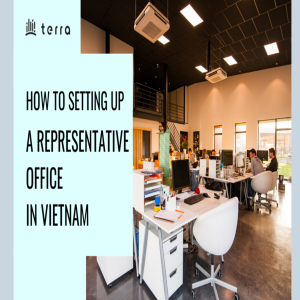Type of business
Representative Office
A Representative Office (RO) offers a low-cost entry option for many companies, and are among the most common for companies that are first-time entrants to the Vietnamese market.
RO’s are often suitable for companies that may be seeking to gain a better understanding of the Vietnamese market with a smaller initial investment, and may be used to pave the way for a larger presence within the country in future years.
RO's are currently permitted to engage in the following activities:
• Conducting market research;
• Acting as a liaison office for its parent company;
• Promoting the activities of its head office through meetings and other activities that lead to business at later stages.
Requirements and registered capital
Registered capital is not a statutory requirement for setting up an RO in Vietnam.
An RO license is valid for five (5) years but can be extended for another five years.
Branch Office
Branch offices (BO) in Vietnam are limited to certain types of service businesses, such as finance and banking. BOs are service providers and provide services other than those specified in specialized legislative documents . BOs may also hire staff directly.
Branch Offices are permitted to engage in the following activities:
• Rent offices;
• Lease or purchase the equipment and facilities required for operations;
• Recruit local and foreign employees;
• Remit profits abroad;
• Purchase and sell goods and commercial activities per licensing;
• Set up accounting, marketing, and HR departments to represent the parent company.
Requirements and registered capital
The BO will need to obtain an establishment license and have a seal with the name of the parent company. The BO will also need to appoint a branch manager who is a Vietnam resident.
Ownership
Foreign companies may appoint a manager from their countries of origin; however, this employee must get a Vietnam work permit to be hired as a BO manager.
Limited Liability Company (LLC)
Typically, investors seeking to setup an LLC will be looking at Vietnam’s ‘100% Foreign-Owned Enterprise’.
An LLC is an incorporated company, with limited legal liability, while a joint stock company is a variation of the same, but which is intended by the investor to become a publicly traded company.
Requirements and registered capital
For most sectors and business lines, Vietnam requires no minimum capital requirements. However, the registered capital will be assessed by the Department of Planning and Investment for whether it is adequate to cover the expenses of the business until it generates enough revenue to cover its costs. It is possible to set up a basic business services company with less than USD 10,000 in some cases, but in most cases it would be at or above this threshold, depending on the nature of the business.
It is best to verify whether your business may require minimum capital investment however, given that some industry sectors (business lines) do have requirements.
Examples include:
• Finance, Banking, Insurance and Fin-tech;
• Language centers or Vocational schools;
• Real estate companies;
Ownership
LLCs can be broken down into two types: single-member LLCs which have only one owner, and multiple-member LLCs, which will have more than one stakeholder. These owners can be private individuals or companies, depending on the requirements of a given investor.
Joint Stock Company (JSC)
A Joint-Stock Company (JSC) in Vietnam is one of the two commonly chosen business entities founded by foreign direct investors with more than three shareholders. It offers a higher level of flexibility for medium and large-sized companies with multiple shareholders, allowing for profit-generating activities, listing on the stock exchange, and more.
A Joint-Stock Company (JSC) is a legal company whose charter capital has been divided into equal shares for each shareholder, following Vietnam’s Law on Enterprises 2020. There must be at least three (3) stockholders. Regarding the maximum number of stockholders, there are no restrictions.
The shareholders can be of any nationality. As a result, the nationality of shareholders in a foreign-invested JSC Vietnam can be structured as
• Solely owned by foreigners
• A joint venture between foreigners and locals
Contrary to a Limited Liability Company, a Joint-Stock Company in Vietnam can issue shares and list them on the stock exchange publicly. By doing this, you can mobilize capital, sell shares, and raise funds more easily. In this article, we will tell you more about a joint-stock company in Vietnam concerning, its structure, advantages, requirements, and setup process.
Joint Venture Company (JVT)
A Joint Venture (JV) is a partnership of companies that are created for a specific business purpose. The owning partners of a foreign-invested Joint Venture can comprise at least two foreign entities or at least one foreign and at least one local entity.
Ownership
Statutory guidelines on foreign ownership, impose a minimum contribution of 30 percent. Beyond this, foreign investors may choose a majority stake with ownership exceeding 50 percent, or a minority share ownership of less than 50 percent in most sectors, given that most industries are open to up to 100% foreign ownership. However, the government also mandates minimum contributions for domestic partners in JVs in some industries.
These business fields require a foreign investor to form a joint venture with a local partner to enter the market:
• Advertising services;
• Agriculture, hunting, and forestry related services;
• Telecommunication services;
• Travel agencies; Tour operator services; Entertainment services;
• Electronic gaming businesses;
• Container handling; Customs clearance services; Auxiliary transport services;
• Internal waterways transport, rail and road transport services.
For investors purchasing stakes in state-owned enterprises equitized on Vietnam’s exchanges, the JSC structure is required.
Requirements and registered capital
The capital requirements for JVs are the same as for 100 percent FOEs (Foreign-Owned Enterprises).







